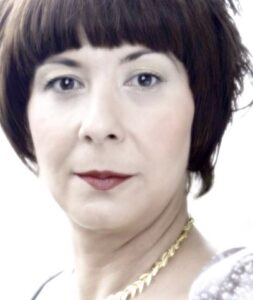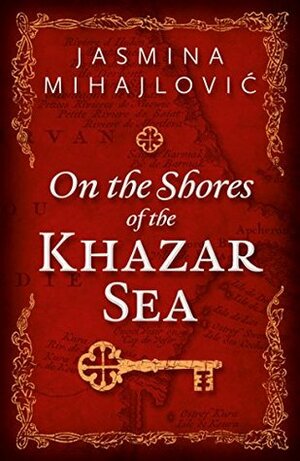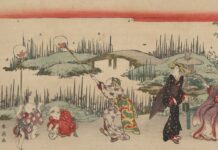Excerpts from book On the shores of the Khazar Sea by Jasmina Mihajlovic; each of these memories (letters) begins with a passage from Milorad Pavić’s last book, Artificial Mole.
(Part-1)
To read Part-2, please click here
Two Wedding Rings for Good Night
The main characters in this narrative are painters. Or… Their names are Philip Rubor and Feretta Sue. After all, the reader can give them whatever names he wants. Behind them they each have a failed marriage and three children from those previous relationships. Still, this new, their second marriage is happy. At least at the time this novel begins, meaning she is now in her prime, her forties, while he will start his eightieth year in November. I should first point out that he is famous, while she is acquiring a female audience, and women are starting to frequent her exhibitions. One could even say that he is slowly going out of fashion, for after two decades at the very top in his work and in his country, after successful exhibitions from New York, London, Paris, Barcelona, Madrid, Rome, Milan, Athens, Moscow, St. Petersburg, to China and Japan, he is now at an age when his health isn’t the best and when his hitherto uncontested fame is dimming. His paintings, as rich and as fine as before, are sought after and sell well abroad, but in his home country no longer fetch the same price at auctions and in galleries as they once did; local auction houses and gallerists are less and less interested. Sometimes he thinks that his canvases would fare better if he were dead…
(Insert from Milorad Pavić’s novel Artificial Mole)
The main characters in my narrative are authors Milorad Pavić and Jasmina Mihajlović. Or at least they were… Milorad Pavić has died, and I, Jasmina Mihajlović… write because writing is my job that I love.
In the country we live in and the time we live in, the first decade of the 21st century having ended, it’s impolite, immoral and suspicious to love both your job and your husband. That’s what we’ve come to. I sometimes feel that I was born with a defect, one that has been ongoing now for fifty odd years… To me the most important thing in life was love. Yet at every step, more and more, faster and faster, I encounter the almost obsessive passion to hate. Anything, everything, and everyone. Hatred pays off; it’s generally accepted, sedative, while love takes effort.
I currently feel as if I’m walled into my own apartment. The love nest has turned into a cold, dumb prison cell. I suppose that’s how every widow feels. As if everything had suddenly turned to stone ad absurdum. Silence, stillness, no phones ringing, the mailbox gobbles nothing but bills, the ticking of analogue clocks becoming noise, nobody even drilling anything in the neighborhood…! Winter, snow, wind, rain, ice, have lasted for months now. As though the climate is conspiring against me too.
Actually, everything is conspiring against everyone. Endless winter, crazy pace of living. obstacles in our paths from the moment we wake up, life styles and getting around ever more complicated, impossible to get anything done without gargantuan effort and much stress…
In all that galimatias I was struck by – the death of my beloved. And I wasn’t permitted to keep it my personal private death of a loved one. Public figures are not permitted a private death. Neither they, nor their relatives. To overcome this unnatural situation, I’ve decided to devote my days to the public death spending months in various offices battling with insane administration, to maintain my husband’s local and global correspondence, to sort his written legacy, but in the evenings, as soon as it gets dark, I turn to my private affairs.
You’ll think that in the evenings I grieve. Of course I do. I grieve terribly. Indescribably and unspeakably. But I’ve come up with a way to ease the pain. Very pragmatic and realistic. I’ve decided to fall in love with my husband all over again.
I have the rare privilege of now reading many Milorad’s books into which he wove our life and love as some kind of belated love letters. I enjoy remembering this situation or that, memories come back more vividly than if I were leafing through analogue-digital photo-video albums, the words caress me, and some things, I must say, now have completely new contours or depth.
And so I read the lines of Second Body, a novel dedicated to me, Tunisian White Cage in the Shape of a Pagoda, a tale in which I am the heroine, I compare our stories in collaborative books Love Story in Two Tales and Two Tales from Kotor, I recollect the Moscow premiere of Forever and a Day whose covers bear the printed dedication: to Jasmina.
Before I go to bed I put on both wedding rings, summoning sweet dreams. Although I’m still wearing black, not so much for custom’s sake but from a deep inner feeling that it helps, I force myself every day to put makeup on and look pretty for myself, for him, and for others. I’ve drawn into my innermost self that feeling of festive love that lit me up from within all these twenty-odd years. I shine, though a huge lump of sadness almost prevents my every breath, I shine for I know I possess the rare fortune of great love, which nobody can take from me, but myself.
*
Belated Love Letters
In his elderly years Philip became more and more out of step with his social environment. In his milieu one cannot, for instance, understand a happy marriage, such as his, or forgive success, forgive things like his global fame. All the more so because this unheard of thing was threatening to double, even to triple. He with his success was a threat to the peaceful community, let alone he and she with their double success that could come. In that case they would have him and her squared, and both of them cubed. That would be too much. Philip was not and could not be indifferent to raised hackles of his milieu.
(Insert from Milorad Pavić’s novel Artificial Mole)
I almost never got love letters from my husband. We began living together immediately, were very rarely apart, perhaps only during business trips, we lived and worked in the same space. And so for seventeen years, until his death. In hospital, several days before his departure from this reality, he told me there was a collection of poems in the drawer of his desk, dedicated to our love.
I didn’t have the courage to take out that sheaf of papers. Not until ten days later, after it all, after the official ending of his life. The collection of poems is called The Epilogue and begins with these verses:
If you were to buy me once more
A notebook with pages blank and unlined
Perhaps I would finally be able
To write you a love letter
The last instead of the first
Was I sad when I read the string of verses? Was I happy because of the last love letter? There are no words to describe my mixed feelings. None at all… I sleep covered in the sheets of paper containing those words, those verses, those last and belated love letters.
I have always cried after sad romantic movies, or love stories that end unhappily. Now I cry first-hand. For my own love story with its unhappy ending. Do all love stories have unhappy endings? Yes! Because none of them end with the comforting sentence, “and they lived happily ever after…” There are happy loves, but they always have an unhappy ending.
But to get back to happiness. Our lives are made up of happiness; it’s just that we don’t notice it. Happiness is the natural order of things, similar to health, so we neither see it nor appreciate it. We’re cursed.
See, now I remember two keys that make me happy. One is from 1992, it’s pink, light, and opened the door to a love nest in the then Georgi Dimitrova Street, today called Ilije Garašanina. When Milorad and I irrevocably decided to live together, we rented a bedsitter in that street. It had an old-fashioned, wide corridor, one room, a tiny closet, a large bathroom, a huge kitchen, and an inner balcony that looked over the gloomy courtyard. Of possessions we had a bed, a table, two chairs, a typewriter, a cooker and an ironing board that doubled as a kitchen table. From his former house Milorad took only his manuscripts, a suitcase and that typewriter on which the Dictionary of the Khazars was written. My future mother-in-law lent me two pots, my ex-husband a mixer. We lived both hungry and full of our love. He was 62, I thirty years younger. He was famous, I was frightened. Terrified of his authority, of my decision to leave my previous marriage in which I had lived cocooned for thirteen years, disturbed to my core, to my DNA, by the love burning in me like a fever.
Were we happy then? Probably. I doubt that large upsets in life can be called – happiness. There was elation, certainly, there was passion, a breathless love choking within itself, but peaceful happiness, contentment, no, there was none of that, at least not at the very beginning, in that bedsitter across from the Tašmajdan park.
Today I keep the pink key in a golden purse shaped like a tiny birdcage. It sits in the drawer of my desk, beside the once-used ballpoints, dried-out fountain pens, scented erasers for manuscripts written in lead pencil, the kind that writes with its heart. It sits next to former writing implements.
Beside the pink key to the beginning of my love is another one, bright red…
*
The Captains’ Writing Box
It was the third Saturday in May, and on that day “Museum Night” began at 6 p.m. and lasted until the following morning. Sixty museums and galleries across town, exhibits, concerts, performances, that one night all for the price of a single ticket… As usual, Phillip and Feretta started out a bit later. They went to the University building, where they saw at the Rectorate an Egyptian mummy that had been brought to the country by a benefactor in 1888, and had last been on display in 1915. In the Students’ Park they found an open-air ecology class and learned how electronic waste can be an inspiration… After that they had the energy for just one more visit. At the Ethnographic Museum they had a look at “Nude photographs of the 20th Century”. Rubbing the sleep from their eyes, they headed home.
As they were approaching their quiet little street, they marveled at all the people around, although it was about half past one in the morning. In front of their building they saw a police car with its rotation lights on. They had trouble getting through, and only on the first floor, when they gave their names and entered their apartment, did everything flash before their eyes.
The apartment was completely empty. Looted down to the last pin. All his and her painting, both easels, even their fish tank had been taken. Both computers had been stolen too, with the pictures of her and his drawings and oils. The empty, carpetless rooms resonated with the voices of police inspectors conducting their investigation. Only the corner of the largest room still held, as always, a huge ceramic stove that resembled a bell tower…
(Insert from Milorad Pavić’s novel Artificial Mole)
The bright-red key opens the door to a high-ceilinged apartment in a lovely building in Dorćol[1], built at the beginning of the last century. For seventeen years that was Milorad’s and my apartment, our love and literary nest. This 2010 I will return from “Museum Night” alone. The building we lived in will soon probably have a memorial plaque: “Here lived and worked for a while Milorad Pavić, Serbian author, 1929-2009.“ How will I feel when I walk into the apartment-museum? I’m not looking forward to it. Love actually doesn’t do well with – public. Love is like twin embryos sheltered in the darkness of warm amniotic fluid, self-sufficient, seeking protection from the hostile world outside.
Yet I now live in a museum. The old Dorćol apartment is actually a Bequest to the city of Belgrade from my husband. Being a native of Belgrade, he officially bequeathed most of his things to the city. Hm… how strange the fate of our love: from the rented apartment near Tašmajdan opened by the pink key, to the museum-apartment in Dorćol, locked by a Ferrari red key. How to live in an apartment not owned by our love and life? Thankfully, there are possessions that tell their tale, trigger sweet or sad memories, almost as if they were reproducing sentences once spoken. A true wireless virtuality.
– Don’t cry, dear heart! We’ll fix everything. Why are you crying? – “says” he.
– I caught sight of the writing box from Kotor and remembered all the happy and unhappy times of our life – I “reply”.
About that captains’ writing box from Kotor that was used by a ship commander to write the ship’s log, to store seals and gold coins in its nooks and crannies, both my husband and I wrote a literary piece. Milorad his Writing Box, I my story Compartments for Coins and Rings. Most children who came to visit used the box as a toy. As some kind of Rubic’s cube. They put it together and took it apart. The box is full of secret cubicles, hidden chambers that open only when you press the wooden sides in the right spot; it has countless nooks, lids, and can be transformed into different shapes. Yet when you look at it, from the outside, it looks like an ordinary rectangular box made of varnished rosewood, edged in brass. Nothing special. Today any gift shop sells much more alluring chests.
Recently a Hungarian doctoral student from Szeged, who was writing a thesis on the work of Milorad Pavić, came to the Dorćol apartment and almost choked with excitement when I showed him the writing box and all its transformative powers. To him the box was just fiction, the title of a novel and the engine behind the plot, not an actual object! I was agitated as well, for a completely different reason. Suddenly I lost touch with reality, overcome by a dizzy feeling of sense and nonsense.
To me the writing box from Kotor was a memento of a rainy evening at the “Fyord” hotel at the peak of the Boka Kotor bay, the memory of a sweet lovers’ tiff, where tears ended in kisses. To Robert, Hungarian doctoral student, it was a literary and historical fact. How could your head not spin with that mixture of public and private!
Perhaps I should be remembering other things…
*
Tunisian White Cage in the Shape of a Pagoda
To resist the hatred that was undoubtedly tightening its ring around them, they kept the scope of their outings and friends to a minimum. It should be noted that, for their own part, their friends were abandoning them as well. So they were more or less left with just her friends. But the hardest part was when those friends started to abandon her, who had crafted their portraits with so much affection. Phillip had long since learned that a person does not have the same friends before and after a great success in life. After success your previous friends abandon you and you have to find new ones, and so you do. Feretta didn’t know, and neither did Phillip really, that this could also be the price of the beginning of success, as in Feretta’s case; they were astounded that her friends had started to abandon them as well. Success is unforgiving, you could tell by that as well. In any case, they bought a fish tank and some fish, which she started training like circus horses, teaching them to do somersaults in the water. And the fish obeyed. They didn’t dare tell anybody that, because they would never have believed them.
(Insert from Milorad Pavić’s novel Artificial Mole)
There are male voices that caress from within. Deep, resounding, slightly hoarse. I’ve always found the attributes of a man’s sexuality to be his voice and how his shoes fit! Now that my beloved is physically no longer with me, I have a secret ritual. One message from my husband has remained on our answering machine. When I’m very sad I put the receiver to my ear and endlessly listen to that “intimate” message asking me to call him as soon as I wake up.
I have no shortage of audio video recordings or DVDs of foreign and local TV shows featuring my husband, but they are public! The accidentally left over telephone message is mine alone! I hope that digital chips can’t wear, that the voice won’t fade and that my modern audio love relic will stay acoustically vibrant for years to come.
And yet, I rightfully wonder, how long is this acute grief going to last? Is the memory of love – actual, live love? How to continue my life, now more than ever some kind of double identity. Before I was good-naturedly or maliciously seen as the wife of Milorad Pavić. They congratulated me on my boldness to enter the world of literature myself, or talked behind my back about how I was “leeching” on my husband’s fame. Now I am the widow of that same person, and, now as then, I never get to be Jasmina Mihajlović. I am now tacitly expected to reaffirm my literary identity, despite my previous books, yet at the same time burdened with looking after his work, continuing his literary career post mortem.
As a metaphorical image of my two-decade-long situation, a cage comes to mind. A huge, ornate Tunisian cage, architecturally resembling a palace. Arabs have for centuries nurtured the art of sound – through the trickle of water in fountains and the chirping of birds in stylized cages. And so their cages are architectural and artistic masterpieces. I wanted to buy one such gigantic cage on vacation in North Africa one year. Bringing such an object back as a souvenir from a trip was a huge hassle. Its size almost classified it as cargo. Its dimensions necessitated a separate seat in the airplane. Anyhow, in a surge of adventurous spirit and serendipitous airplane circumstances we brought home that cage. In it I keep an artificial bird, albeit a beautiful one, with glass eyes and made of real feathers, but lifeless. I have live fish, but voiceless, and the bird is dead, artificial. Not a sound anywhere.
During the years of our married life and literary creation, in the charge of constant mutual seduction on all planes. I wished for my husband to write me a story in which would be the heroine. I wished, with every right, for that very vain yet precious gift. The restrictions I set my author regarded only the house in which I was to live as the protagonist. You can learn all about this literary game in the book we published together, called Love Story in Two Tales. Now back to the ornate cage. The story that Pavić wrote as my love order was called Tunisian White Cage in the Shape of a Pagoda. I was shocked both by the title and by the content. “Our” cage isn’t white; its foot is of heavy olive tree the color of dark Mediterranean honey. Its grill-like arabesques are of harsh gray metal. It doesn’t look the least bit ethereal, light, lovey. And such is the story. Beautiful yet heavy.
All in all, the Tunisian cage is some kind of metaphor for my life, however mistaken others may think I am. Everybody’s life is a cage of sorts. Except there are times when the birds are let out of their cage to fly free. Albeit inside the room! In their private freedom.
My and everybody else’s freedom depends on the choice of when and whether to leave the cage, how long to flutter about the room and whether to find the courage to fly out through the window. Nobody knows what’s out there.
*
The Three Tables
Everything in the apartment was just as it had been. The walls held his paintings, not the ones that had been stolen but others. The other pieces of furniture were there as well. The fish tank, the white four-seater sofa in the large room, the nailless desks, the same ones, which had been located somewhere and returned. On them sat a nineteen-inch monitor on his, and on Feretta’s, a laptop. Both computers were showing slide-shows of reproductions of paintings and sculptures. He looked at “his” computer and recognized one of his paintings from 2001.
(Insert from Milorad Pavić’s novel Artificial Mole)
In our complex romantic-marital-literary relationship we lived almost all seventeen years at 300 km/h. Now I think I could never again stand that pace. It’s not just the objective pace of living, the sequences of events, situations, travels, but some inner emotional tenseness. A lot of love, many quarrels, endless conversations, battling opinions, tears, elation, fear, delight, obsession with one another… Although it seemed to me that we were living as any ordinary couple, now I see that we weren’t. While you’re on the inside of an event, a relationship, something ongoing – you don’t see it at all! They say the inside of a hurricane, its “eye”, is calm. The silent motionlessness of a vacuum.
Pavić said, both to me and publicly, that a love is alive only as long as it’s changing. At the same time, that’s the hardest form of love to master. We’re more or less used to life as a race, but how to manage that in love, which seeks routine as much as it does change?! The solution probably lies in curiosity and courage.
It takes a great deal of courage to take apart your life and then rebuild it again. Now I’m once more at that place. At an end and at a beginning. I remember when we moved to the apartment in Dorćol we didn’t have a single desk! Or rather, we had a computer semi-desk on wheels, the old-fashioned kind, upper surface, lower surface… although now that I think about it in 1992 computers weren’t really in use yet. It was probably some kind of TV table. Anyway, we had two typewriters, an electric one and a manual clack-clack, with ribbon that smeared your fingers every time you changed it. (Oh dear, as I’m writing this I realize I sound like a dinosaur!). Pavić who was 62 at the time and a writer of world fame didn’t have a writing desk! All his things had remained at his former home. I don‘t think he had any regrets about his things, possessions, memories, he decided to leap into the abyss of a completely new life. I was then the proud author of one book and a number of works in professional magazines. But, we had no desk…
How do writers buy desks? They are almost a part of their personality and creativity. Semi-living creatures. Today most authors use their own lap and a laptop as their entire workspace, but then, at the time I’m writing about, people weren’t yet mobile but stable beings. So we searched for pieces of furniture to be our new creative home. Three years later we found them. They were made by architect Kucina. A male writing desk of oak and a female one of white ash. I’m currently writing these lines on my female desk; it’s summer and the laptop in my lap is too hot, so I’ve decided on the classical version of typing on a writing desk.
The tale of the search, complications and buying of the writing desks is described in my story The Three Tables, again part of a collaborative book by Milorad and myself, Two Tales from Kotor. My present readers shouldn’t be surprised that our Belgrade desks have something to do with Kotor. They do. It’s a long story and a long journey.
There’s another table linked to our public-private life. It’s a glass dining-room table. Many Serbian and foreign photographers have immortalized it in pictures, as it’s suitable for photographs. The dining-room table with its wrought-iron chairs was made by designers from Novi Sad, teamwork of a woman and a man. It is unusual in the manner in which the uneven triple-layered glass top was made. One friend, seeing the table, told us that its surface has the color, texture and transparency of the sea off Bora Bora. Since then we’ve called this piece of furniture beside which we’ve enjoyed many lovely moments with family and friends our Bora Bora table.
Lest this writing become an inventory of the furniture of a Dorćol apartment, I must remind of the sad but known fact that things tangibly last longer than the people owning and using them in their short lifetimes. I was always confused by something my husband used to say when I was in the housewifely throes of cleaning, nurturing and caring for our possessions: “Never mind that… all those things will outlive us! They’re not worth the energy you spend on them.” Now, as I write this, I’m painfully aware of the truth in this remark, but also of the pleasant, comforting warmth created by memories. What else do I have left…
[1] One of the oldest urban neighborhoods of Belgrade
(Part-2 of the excerpts will be published in Modern Literature during the first week of Dec 2023).
About the Author

Jasmina Mihajlović was born in Niš (Serbia). She is a writer, literary and hyperfiction critic. She manages “The Milorad Pavić Bequest”, Serbia. She graduated in 1987 from the Faculty of Philology at the Belgrade University – Department of Yugoslav and foreign literature. She has taught literature in Belgrade secondary schools since 1987; from 1991 to August of 1999 she was Director of the Council for promoting Serbian culture abroad, with the World Serbian Community seated in Geneva. She is member of the Serbia Literary Society.
More about her at https://www.khazars.com/index.php/en/web-jasmina-mihajlovic/biography-and-books.html

















